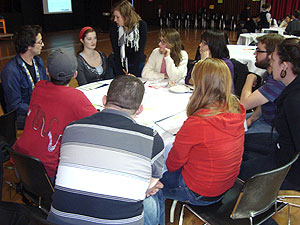 |
| More than 100 students came together for the Brains for Change conference on the weekend.(Katelynn Northam Photo) |
More than 100 students put their collective brains together to think about what kind of a university they’d like to see in the future.
Held last weekend, Brains for Change was a conference initiated by Dal students and backed jointly by the Dalhousie Student Union, the university administration, and 11 faculties. Its goal: to create a culture of leadership at Dalhousie and foster inter-disciplinary conversations.
Co-organizer Jamie Arron, a third-year student in international development studies, says the conference was born from a desire on the part of Dalhousie students to have more university-wide discussion. “Students wanted to see more opportunities to come together,” he explains.
The DSU traditionally holds a leadership conference each year, but it was felt that there was more opportunity to create tangible results than that one-day meeting could provide. Brains For Change was initiated by the DSU, and the DSU's vp internal Mark Hobbs brought students Jamie Arron, Andrew Bateman and Rachel Derrah on board to organize.
“It was a major learning experience for us all,” says Mr. Arron speaking towards the close of the conference. “We’re trying to create a real sense of campus community.”
Each faculty financially supported the students who attended the conference, and in addition to this, the DSU put up the money to support the other costs of the conference. Think Digital Media, a corporate sponsor, provided the $2,500 that went towards the winner of the Social Innovation Challenge while senior administration donated $3,000 to support student-led initiatives coming out of the conference.
Overall the event seemed well received by participants, with most giving up the remainder of their weekends and returning the second day for more.
“The speakers encouraged me to make change now, not to wait until we graduated,” says Austin Oswald, a participant from the Faculty of Health Professions.
“It was fantastically organized,” agrees Katie Merwin, a third-year History major. “All the workshops built on each other. They had clear vision, and it wasn’t just sitting around talking about what we needed changed.”
One of the outcomes of the conference was the creation of several task forces that plan to tackle particular issues at Dalhousie. While the first day was spent having conversations within faculties, identifying areas of concern and networking with each other, the second day was about bridging the divides between faculties and coming up with possible solutions to areas of concern. The $3,000 from senior administration will be split evenly among the seven projects that emerged from these discussions.
Some of these, (while still in the early stages of formulation,) include the creation of a centralized service learning program, creating a flag for Dalhousie, and other projects focusing on innovative approaches to education and improving student-faculty dialogue as well as dialogue between students in different disciplines.
However, some participants felt that having the $3,000 available created too much competition between conference goers. Nonetheless, says Kaleigh Kuchinski, a participant majoring in anthropology and Spanish, pointed out that even those whose ideas didn’t make it to the final stages were able to exchange information with others and were encouraged to take their ideas further after the conference.
Participants pointed out, perhaps not surprisingly, that most faculties had similar ideas and concerns, showing that many Dal students have the same vision for their school.
Saturday night, participants also voted for the winner of the Social Innovation Challenge. This was an ongoing competition, beginning with about a dozen potential community projects that needed financial support. The finalists were narrowed down to three over the past few months, and at the conference participants were able to watch presentations by all the candidates and vote for their favourite. The winner was Engineers Without Borders. (Stay tuned for more information about this project.)
Only time will tell if the conference’s mandate to create true grassroots action will be successful, but the conversations seemed to show promise.
“Students asked the Student Union to be supportive, provide opportunity, and be the host of dialogue,” says Mr. Hobbs. “I think all these things have been accomplished at this conference.”
